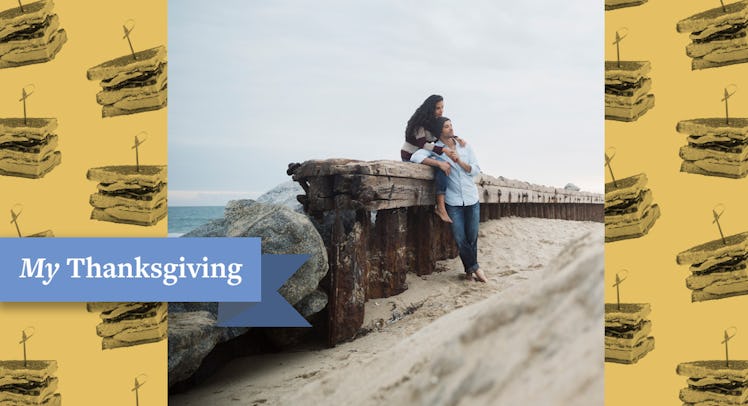My Thanksgiving: A Native American On Celebrating Gratitude, Not History
"It's a great reason to do amazing things, and express gratitude, and think about others besides yourself. I just wish we could let go of the mythology that goes with it."

Thanksgiving is a holiday that’s most popularly recognized as an occasion to eat too much, watch television, fight with your in-laws, and occasionally give thanks, but the reality is much more diverse. In “My Thanksgiving,” we’re talking to a handful of Americans across the country — and world — to get a broader sense of the holiday. For some of our interviewees, they have no traditions at all. But the day — steeped in American mythos, an origin story that comes with great complications — is at least passively observed by even the most agnostic of patriots. In this installment, a Larissa FastHorse, a Native American playwright who moved from South Dakota to the West Coast, talks about the myth of the holiday and how she tries to divorce it from its troubled beginnings.
I’m Sicangu Lakota, from the nations of South Dakota. [In the past] like most Americans, we just kind of celebrated Thanksgiving as a good time to hang out with your family. We’ve never done Pilgrims and Indians or any of that business. That’s never been a part of it and it definitely never will be. My family celebrates it more as a day that we all take off and spend together without any reference to [Thanksgiving], to the history or reasoning behind it.
I wrote this play called “Thanksgiving Play,” and honestly at the beginning, I was like, “Oh, this will just be a funny, cheerful play about revisionist history.” I had no idea how incredibly complicated the history of Thanksgiving is. The whole thing is a myth. It’s a constructed history that was ultimately pushed to service at the end of the Civil War by Abraham Lincoln to try to reunite the nation after the Civil War.
[Thanksgiving] is a great reason to do amazing things, and express gratitude, and think about others besides yourself. I just wish we could let go of the mythology that goes with it.
There are so many versions of stories that were the start of the first of Thanksgiving. One of them involves a celebration of John Mason going to a Pequot village early in the morning, killing 300 men, women, and children, bringing their heads home, and then kicking them around the pilgrim colony as the first ball game of Thanksgiving. There’s a place in St. Augustine, Florida, that claims the site of the first Thanksgiving. There’s a place in El Paso, Texas, that claims the first Thanksgiving was in April. Some people even say that this whole thing was created as a fiction to celebrate the victory of capitalism over communism with the Pilgrims.
Pilgrims were crazy about writing everything down. When they showed up and robbed all the graves of the Native people and stole all their food, they wrote about it. They were not shy to write about what they were doing. That thing we see on television with the Natives bringing food to the Pilgrims and all of that, there isn’t one date [where that happened.]
So Thanksgiving is actually an amalgamation of all different events, some of which were incredibly dark, and some of which were very peaceful and humanitarian. There are just so many different stories. It’s just fascinating to me how much people don’t want to acknowledge them.
The Mohicans, for instance, celebrate Thanksgiving. They’ll tell the story of when their ancestors saw the ships arrive. [First contact] had a devastating experience oh the Natives and the Pilgrims. They also had some really wonderful experiences, as always happens when you meet a new culture. More people are having “National Day of Mourning” events around the country, which I think is kind of awesome. There are more pow-wow’s now on Thanksgiving.
There’s nothing wrong with a day set aside in our national calendar to express gratitude and to think about the things we are grateful for in our life. It’s such an incredible reason to have a holiday. It’s a great reason to do amazing things, and express gratitude, and think about others besides yourself. I just wish we could let go of the mythology that goes with it.
This year, we will have a traditional, dominant-culture Thanksgiving. We have friends that count on us for that in Los Angeles. A lot of people are sort of orphans without family. I’ll be in rehearsals at the time for a different play, so that will be my only day off that week. My husband’s favorite part of Thanksgiving is the sandwiches. Sometimes we’ll just cook the turkey in the morning and later we’ll have sandwiches. We go to the beach because we live in California, and have a bonfire with leftover turkey sandwiches with turkey, stuffing, a little bit of fried mashed potato, and cranberry sauce. My husband adds mustard. That’s as big as our tradition gets. Find the truth and go with that.